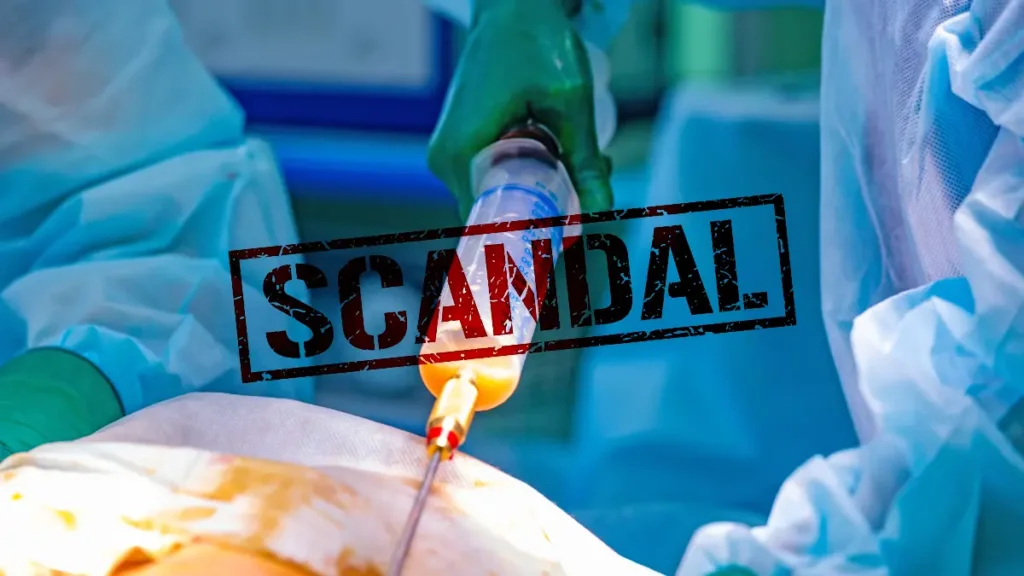The UK’s beauty and aesthetics industry is worth a staggering £3.6 billion. Mostly driven by rising demand for treatments that promise flawless skin and body contouring without invasive surgery. However, a recent ITV investigation has shone a harsh light on the industry’s unregulated underbelly. Dangerous practices by so-called “wild west operators” are endangering lives.
The shocking revelations, captured in the documentary Britain’s Backstreet Surgery Scandal, reveal the chilling reality of untrained practitioners performing high-risk procedures in beauty salons across the country.
From makeshift fat-reduction courses to botched liquid Brazilian Butt Lifts (BBLs), the investigation underscores the urgent need for tighter regulations in a sector that remains disturbingly vulnerable to rogue operators.
Secret Filming Unveils Dangerous Practices
As part of a year-long investigation, ITV’s undercover reporter signed up for a one-day training course on fat-reduction procedures at Luxury Medical Aesthetics in Clapham, South London. The company is owned by Daria and Monika Wisniewska. For a fee of £1,500, attendees were promised certification in a treatment that involved making incisions and manually suctioning fat from clients’ faces and bodies.
Hidden cameras captured the horrifying moment a trainer made an incision in a client’s jawline before inserting a sharp, metal suction wand to crudely extract fat. The client, under local anaesthetic, was visibly distressed, yet the procedure continued. Chillingly, the trainer nonchalantly admitted, “I’ve only ever damaged two nerves and one artery”.
Even more shocking, students on the course were invited to take over the procedure with no prior medical training. Despite excusing herself before participating, the undercover reporter received a certificate certifying her as qualified.
“It’s unbelievable and disgusting” said consultant plastic surgeon Professor Iain Whitaker. “How she can be allowed to do this, with zero training or medical background, is beyond belief. This has nothing to do with patient care. It’s profiteering at its most dangerous”.
A Tragic Toll: The Case of Alice Webb
While the risks of unregulated procedures are well-documented, their consequences became heartbreakingly clear with the death of Alice Webb, a 33-year-old mother of five. Alice died hours after undergoing a liquid BBL. A non-surgical alternative to the Brazilian Butt Lift, at a clinic in Gloucester.
This procedure involves injecting hyaluronic acid fillers into the buttocks to create volume. While marketed as non-invasive, liquid BBLs carry significant risks, including blood clots, sepsis, and tissue death. Alice’s family has since called for “Alice’s Law”. A proposed regulation to restrict such procedures to registered plastic surgeons operating within Care Quality Commission (CQC)-regulated environments.
“Alice’s death has left our family devastated” said her partner, Dane Knight. “We need stronger laws to stop these dangerous procedures from being carried out by unqualified people”.
Recent Cases
- Hayley Dowell, a 38-year-old British woman, died after undergoing a Brazilian butt-lift (BBL) operation in Turkey. The inquest revealed that her surgeon left midway through the procedure, leaving the anesthetist to continue. Hayley suffered an embolism and passed away shortly after. A truly tragic case.
- Alice Webb, a 33-year-old mother of five, tragically died following a non-surgical BBL procedure in Gloucester, UK. This incident marked the first reported death in the UK from such a procedure. Non-surgical BBLs, often involving filler injections to enhance the buttocks, carry significant risks, including infections, sepsis, tissue necrosis, and even life-threatening complications.
- Charlotte Booth, 36, underwent a non-surgical BBL in May 2023, which left her disabled and severely affected her health. She suffered from sepsis, gangrene, and necrotic abscesses, leading to emergency surgery and a lengthy recovery process. Her experience exposed the dangers associated with liquid BBLs, without proper medical oversight.
The Alarming Statistics
ITV’s investigation revealed that the problem isn’t isolated. Freedom of information requests uncovered 1,193 ambulance callouts since 2021 to businesses with “beauty” or “aesthetics” in their name. Complaints to local authorities about aesthetic procedures have surged. They have reached 670 in the past five years.
Common issues include “major trauma” “immediate threats to life” and complications like nerve damage. These incidents highlight the stark contrast between the strict regulations governing doctors, overseen by the General Medical Council (GMC). And the virtually unchecked practices of non-medics performing high-risk treatments.
A Call for Action
In response to the scandal, Labour Health Secretary Wes Streeting has vowed to tackle the issue. “It’s absolutely disgusting that there are wild west operators practising dangerously in cosmetic surgery, putting people’s lives at risk”, he said. “We’ve seen the tragic consequences in cases like Alice’s”.
However, calls for reform are not new. In 2023, the Conservative government conducted a public consultation on non-surgical cosmetic procedures. But they failed to introduce new regulations before the election. Critics argue that the lack of follow-through has allowed unqualified practitioners to continue operating unchecked.
Medical professionals are urging consumers to exercise extreme caution when considering non-surgical treatments. Consultant dermatologist Dr Jane Simmons advises, “Always choose practitioners registered with reputable bodies and operating from regulated clinics. If the price seems too good to be true, it probably is”.
Professor Whitaker echoed these sentiments, stating, “Patients need to understand the risks involved and demand higher standards from the industry. Education and transparency are key”.
The Impact of Rogue Operators
The surge of untrained, unregulated practitioners is not only putting patients at risk but also damaging the reputation of the wider aesthetics industry. Legitimate clinics, staffed by qualified professionals, are struggling to differentiate themselves from unsafe operators.
“This isn’t just a matter of consumer safety. It’s about protecting the integrity of an industry that has the potential to change lives for the better”, said Dr Simmons. “We need robust regulations to restore trust and ensure that aesthetics remains a force for good, not harm”.
As the UK aesthetics industry continues to grow, the exposure of these backstreet practices serves as a wake-up call for both regulators and consumers. With lives at stake, the pressure to implement Alice’s Law and other safeguards has never been greater.


